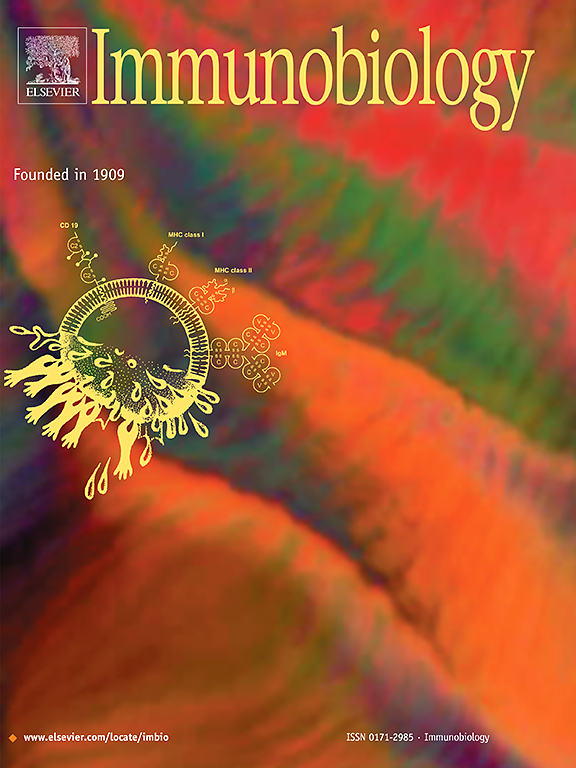Exploring the role of diosgenin in modulating RUNX1 and HIPK2 transcription to mitigate Primary Sjögren's Syndrome
IF 2.3
4区 医学
Q3 IMMUNOLOGY
引用次数: 0
Abstract
Background
Primary Sjögren's Syndrome (pSS) is a chronic autoimmune disease characterized by inflammation of the exocrine glands, resulting in symptoms like dry mouth and eyes. Despite existing symptomatic treatments, underlying immune dysregulation remains undefined. Diosgenin, a steroidal saponin derived from Mai Dong, shows potential in modulating immune responses, but its mechanism in pSS remains underexplored.
Methods
This study investigated the immunomodulatory effects of diosgenin on pSS using in vivo and in vitro approaches. In vivo, salivary flow rate measurement, histological analysis, quantitative real-time PCR (qRT-PCR), flow cytometry and Western blot were performed on NOD/ShiLtJ mice after treatment with diosgenin at various concentrations. In vitro, CD4+ T cells isolated from these mice were treated with diosgenin to assess T cell differentiation via flow cytometry, qRT-PCR, Enzyme-Linked Immunosorbent Assay (ELISA) and Western blot, where Homeodomain-Interacting Protein Kinase 2 (HIPK2) overexpression and Runt-associated transcription factor 1 (RUNX1) knockdown were manipulated.
Results
Diosgenin stabilized salivary flow rates, reduced lymphocytic infiltration and inflammatory cytokines levels, upregulated RUNX1 and downregulated HIPK2, which modified T cell dynamics by promoting regulatory T cells (Treg) and reducing T helper 17 (Th17) populations. However, HIPK2 overexpression reversed the effects of diosgenin on inhibiting Th17 differentiation and inflammatory cytokines levels and promoting RUNX1 level. Additionally, RUNX1 knockdown also offset the suppressive effects of diosgenin on Th17 differentiation, inflammatory cytokine levels, and HIPK2 expression.
Conclusion
Diosgenin effectively impacts immune responses in pSS, potentially through the modulation of RUNX1 and HIPK2 transcription factors, leading to a reduction in Th17-mediated inflammation.

探讨薯蓣皂苷元在调节RUNX1和HIPK2转录以减轻原发性Sjögren综合征中的作用
原发性Sjögren综合征(pSS)是一种慢性自身免疫性疾病,其特征是外分泌腺的炎症,导致口干和眼睛等症状。尽管已有对症治疗,但潜在的免疫失调仍未明确。薯蓣皂苷元是一种源自麦冬的甾体皂苷,具有调节免疫应答的潜力,但其在pSS中的机制尚不清楚。方法采用体内法和体外法研究薯蓣皂苷元对pSS的免疫调节作用。在体内,对不同浓度薯蓣皂苷元处理NOD/ShiLtJ小鼠进行唾液流速测定、组织学分析、定量实时荧光定量PCR (qRT-PCR)、流式细胞术和Western blot检测。通过流式细胞术、qRT-PCR、酶联免疫吸附试验(ELISA)和Western blot检测从这些小鼠中分离的CD4+ T细胞的分化情况,并对同源结构域相互作用蛋白激酶2 (HIPK2)过表达和RUNX1相关转录因子1 (RUNX1)敲低进行调控。结果薯蓣皂苷元稳定唾液流速,降低淋巴细胞浸润和炎症因子水平,上调RUNX1和下调HIPK2,通过促进调节性T细胞(Treg)和减少辅助性T细胞17 (Th17)的数量来改变T细胞动力学。然而,HIPK2过表达逆转了薯蓣皂苷元抑制Th17分化和炎症细胞因子水平、促进RUNX1水平的作用。此外,RUNX1敲低也抵消了薯蓣皂素对Th17分化、炎症细胞因子水平和HIPK2表达的抑制作用。结论薯蓣皂苷元可能通过调控RUNX1和HIPK2转录因子,有效影响pSS的免疫应答,从而减少th17介导的炎症。
本文章由计算机程序翻译,如有差异,请以英文原文为准。
求助全文
约1分钟内获得全文
求助全文
来源期刊

Immunobiology
医学-免疫学
CiteScore
5.00
自引率
3.60%
发文量
108
审稿时长
55 days
期刊介绍:
Immunobiology is a peer-reviewed journal that publishes highly innovative research approaches for a wide range of immunological subjects, including
• Innate Immunity,
• Adaptive Immunity,
• Complement Biology,
• Macrophage and Dendritic Cell Biology,
• Parasite Immunology,
• Tumour Immunology,
• Clinical Immunology,
• Immunogenetics,
• Immunotherapy and
• Immunopathology of infectious, allergic and autoimmune disease.
 求助内容:
求助内容: 应助结果提醒方式:
应助结果提醒方式:


